Ceylon's Green Gold: Unveiling the Tea Treasures of Nuwara Eliya
Emerald hills roll endlessly into the mist, the air crisp and fragrant with the scent of tea leaves, and time seems to slow to the gentle rhythm of nature. Welcome to Nuwara Eliya, Sri Lanka's crown jewel of tea production and a haven for those seeking a taste of colonial charm mixed with breathtaking natural beauty. Join us at Tweet Tours as we embark on a sensory adventure through the heart of Ceylon tea country.
Sri Lanka
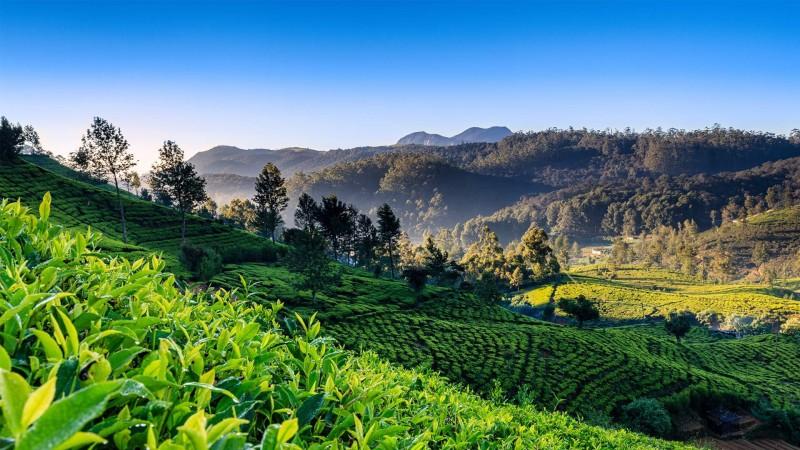
The Birth of a Tea Empire
As dawn breaks over Nuwara Eliya, painting the sky in hues of pink and gold, the region's transformation into a tea paradise unfolds before us. It's a tale of resilience and innovation that began in the late 19th century.
Coffee plantations once stretched as far as the eye could see, a verdant sea of green promising prosperity. But nature had other plans. A devastating blight struck, wiping out entire crops and threatening livelihoods. In this moment of crisis, an unlikely hero emerged: James Taylor, a Scottish pioneer with a vision that would change the face of Nuwara Eliya forever.
In 1867, on a modest 19-acre plot at the Loolecondera Estate, Taylor planted the first tea seeds. Little did he know that these tiny seeds would grow into a revolution, transforming Nuwara Eliya from a coffee haven to the tea capital of Sri Lanka.
Today, as you stand in those same fields, history whispers through the rustling leaves. The air is thick with the earthy aroma of tea, a scent that has perfumed these hills for over 150 years. It's a tangible connection to the past, a reminder of the ingenuity and perseverance that turned crisis into opportunity.
But Taylor's pioneering spirit was just the beginning. As word spread of Nuwara Eliya's perfect tea-growing conditions - high altitude, cool climate, and mineral-rich soil - more plantations sprang up. The region's landscape began to change, with neat rows of tea bushes replacing coffee plants, and colonial-style factories dotting the hillsides.
One such landmark is the Pedro Tea Estate, established in 1885. This living piece of history offers visitors a glimpse into the golden age of Ceylon tea. As you approach the estate, you're greeted by a sea of manicured tea bushes, their glossy leaves glinting in the sunlight. The colonial-era factory, with its red-brick facade and large windows, stands as a testament to the enduring legacy of Nuwara Eliya's tea industry.
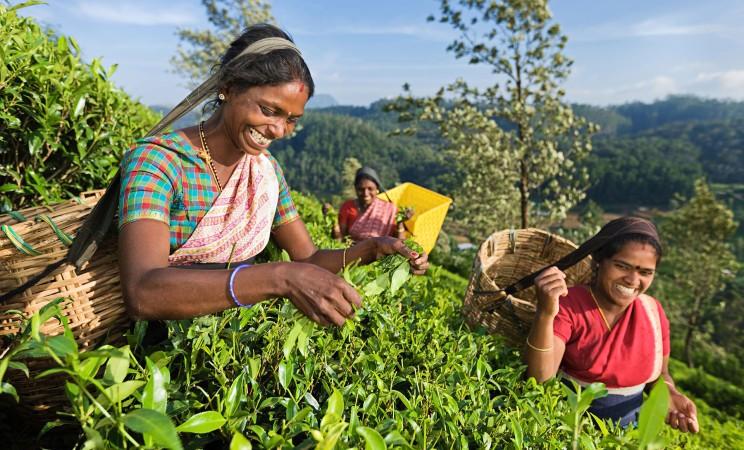
The Art and Science of Tea Making
Our journey takes us to the heart of tea production: the factory. Stepping inside is like entering a different world. The atmosphere shifts, the air warm and humid, filled with the complex aromas of fermenting tea leaves. The rhythmic hum of machinery provides a soothing backdrop to the intricate dance of tea production.
At the Pedro Tea Factory, one of the best tea estates and factories tea lovers must-visit, you'll witness the transformation of humble tea leaves into the aromatic elixir that graces cups around the world. The process is a delicate balance of art and science, tradition and innovation, honed over generations.
The journey begins in the fields, where skilled pluckers demonstrate their craft. With nimble fingers and keen eyes, they select only the finest leaves - the legendary "two leaves and a bud" that are the hallmark of quality tea. This is no simple task; it requires years of experience to develop the speed and precision needed to harvest tea at its peak.
Inside the factory, the real magic happens. The leaves are carefully withered, reducing their moisture content and preparing them for the next stages. Then comes the rolling, a process that releases the leaves' essential oils and begins the oxidation that gives black tea its distinctive flavor.
Fermentation follows, a critical step where the leaves are exposed to oxygen, darkening in color and developing complex flavors. Finally, the leaves are dried, halting the oxidation process and locking in the flavors that will be released when the tea is brewed.
Each step is crucial, a carefully choreographed process that brings out the unique flavors and aromas of Nuwara Eliya tea. As Mr. Perera, a third-generation tea maker and our expert guide, explains, "Making tea is like composing a symphony. Each note must be perfect for the final piece to sing."
But the art of tea making in Nuwara Eliya isn't just about following a set process. It's about understanding the nuances of each batch of leaves, adjusting techniques based on weather conditions, and constantly striving for perfection. This dedication to quality is what sets Nuwara Eliya tea apart and has earned it a place among the world's finest teas.
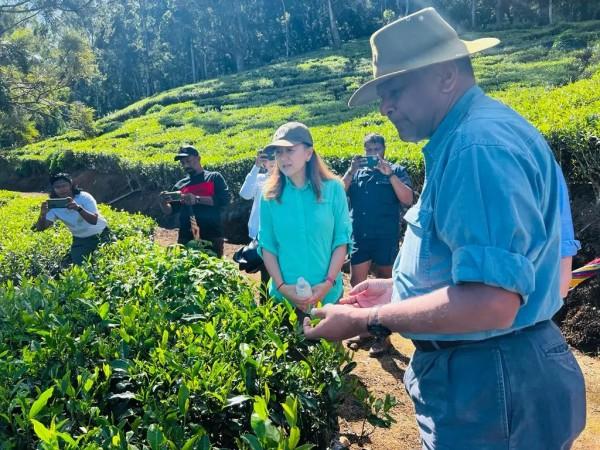
A Taste of Tradition
No visit to Nuwara Eliya would be complete without indulging in a proper tea tasting. At the Heritance Tea Factory, a unique hotel converted from an old tea factory, you'll embark on a sensory journey that will forever change the way you think about tea.
The Heritance Tea Factory itself is a marvel, a clever repurposing of industrial heritage into luxurious accommodation. As you approach, the building's green-and-white facade stands out against the lush landscape, a reminder of the region's colonial past. Inside, many of the original factory features have been preserved, creating a unique atmosphere that blends history with modern comfort.
In the hotel's cozy tasting room, surrounded by antique tea-making equipment and vintage photographs, you'll learn the art of tea appreciation. Your guide, a certified tea sommelier, will walk you through the nuances of different tea varieties, from the bold, full-bodied flavor of Orange Pekoe to the delicate, floral notes of Silver Tips white tea.
As you sip, you'll discover that tea tasting is an art form in itself. You'll learn to appreciate the color of the brew, inhale its aroma, and savor the complex flavors that dance across your palate. Each variety tells a different story - of soil conditions, of weather patterns, of careful cultivation and expert processing.
But tea in Nuwara Eliya is more than just a beverage; it's a cultural touchstone. In Sri Lankan culture, offering tea is a gesture of hospitality, a way of welcoming guests and fostering connections. As you participate in this tasting, you're not just sampling flavors; you're partaking in a centuries-old tradition that lies at the heart of Sri Lankan social life.
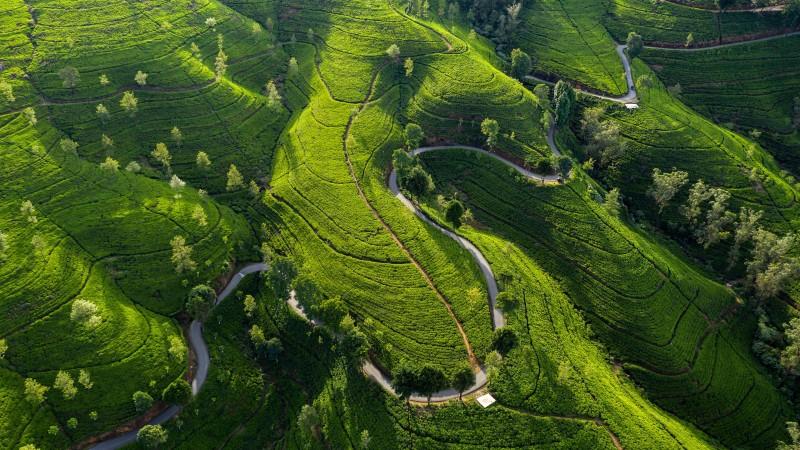
Sustainability: Nurturing the Future
Nuwara Eliya's tea industry isn't just about preserving tradition; it's also about innovating for the future. As global concerns about climate change and environmental impact grow, many tea estates in this region are leading the charge in sustainable practices, setting an example for agricultural industries worldwide.
Take the Lovers Leap Estate, for instance. Named for the dramatic cliff that overlooks the plantation, this estate has become a beacon of sustainable tea production. As you approach, you'll notice solar panels glinting in the sunlight, powering much of the factory's operations. This shift to renewable energy isn't just good for the environment; it's also helping to reduce production costs, ensuring the long-term viability of the industry.
Walking through the estate with Ms. Jayawardena, an environmental scientist turned tea planter, you'll discover a world where modern technology and ancient wisdom coexist harmoniously. Rainwater harvesting systems ensure that every precious drop is used efficiently, a crucial adaptation in the face of changing rainfall patterns. Meanwhile, sophisticated soil sensors help optimize fertilizer use, reducing runoff and protecting the surrounding ecosystem.
But sustainability here goes beyond just environmental concerns. Many estates in Nuwara Eliya, including Lovers Leap, are at the forefront of fair trade practices. These initiatives ensure that the benefits of the tea industry are shared equitably with workers and local communities. As you explore the estate, you might see newly built worker housing or a community center funded by fair trade premiums.
The commitment to sustainability extends to the fields themselves. Organic farming methods are increasingly common, protecting both the tea and the rich biodiversity of the region. "We're not just growing tea," Ms. Jayawardena explains, pausing to point out a vibrant bird flitting between the bushes. "We're nurturing an entire ecosystem."
This holistic approach to sustainability is not just good for the environment and local communities; it's also producing some of the finest teas in the world. The organic, sustainably grown teas from Nuwara Eliya are gaining recognition among connoisseurs for their exceptional flavor and purity.
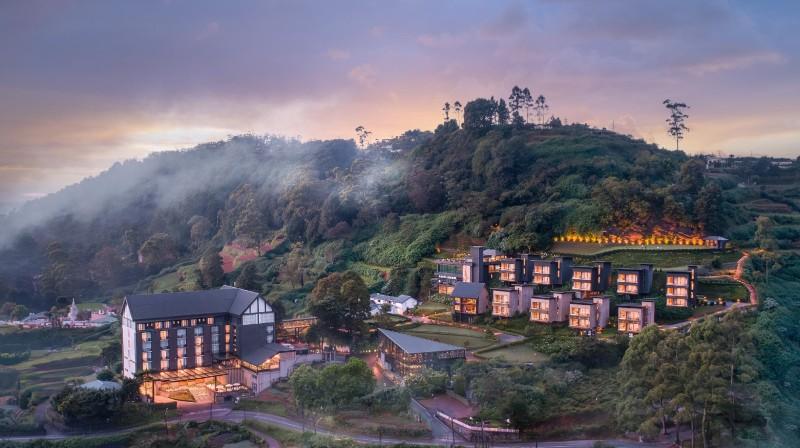
Beyond the Teacup: Nuwara Eliya's Hidden Treasures
While tea is undoubtedly the star of the show in Nuwara Eliya, the region offers a wealth of experiences for the curious traveler. As the afternoon sun begins to dip, casting long shadows across the plantations, Tweet Tours will guide you through some of the area's other attractions, each with its own unique charm and history.
A visit to Victoria Park, a beautifully manicured garden in the heart of town, offers a peaceful respite from the day's adventures. Established in 1897 to commemorate Queen Victoria's Diamond Jubilee, the park is a living museum of colonial history and horticultural artistry. As you stroll along its winding paths, you might spot rare bird species like the Kashmir flycatcher or the Indian blue robin, drawn to the park's diverse flora.
For the more adventurous, a pre-dawn hike to World's End in nearby Horton Plains National Park promises an unforgettable experience. This UNESCO World Heritage site is a biodiversity hotspot, home to an array of endemic species found nowhere else on Earth. The hike to World's End, a sheer cliff with a drop of about 4,000 feet, offers breathtaking views of the tea country below. Standing at the edge of the precipice as the sun rises, painting the valleys below in a palette of gold and green, is a moment that will stay with you long after you've left Sri Lanka.
No visit to Nuwara Eliya would be complete without a stop at the charming Gregory Lake. Created in 1873 by Governor William Gregory, the lake was originally intended as a source of electricity for the town. Today, it's a popular recreational spot where you can rent a paddle boat, enjoy a picnic on the grassy shores, or simply sit and watch the play of light on the water as the day draws to a close.
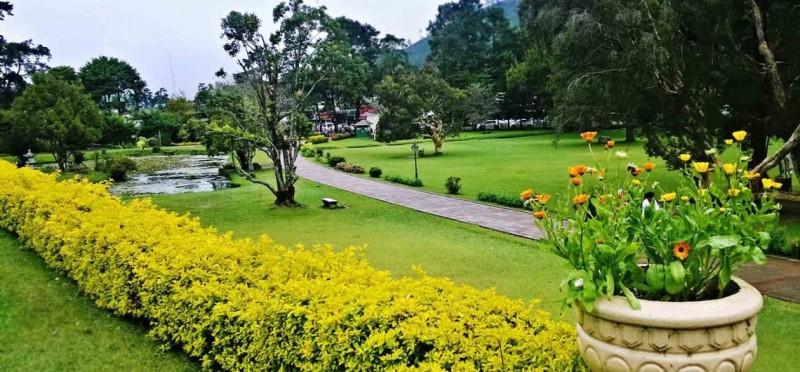
A Legacy Steeped in Flavor
As our journey through Nuwara Eliya comes to an end, we find ourselves back where we started, sipping a final cup of tea as the sun sets behind the mountains. But now, this simple act is imbued with new meaning. Each sip is a connection to the land, to the people who have nurtured these plantations for generations, and to a tradition that has shaped the identity of an entire region.
Nuwara Eliya's tea industry is more than just an economic powerhouse; it's a living, breathing part of Sri Lanka's cultural heritage. It's a testament to human ingenuity, a celebration of nature's bounty, and a bridge between past and future.
The story of Nuwara Eliya's tea is one of resilience, innovation, and dedication. From James Taylor's first experimental plot to the sustainable, high-tech estates of today, the industry has continually evolved while staying true to its roots. It's a story written in the verdant hills, the colonial architecture, and the very fabric of local society.
As you leave Nuwara Eliya, you'll carry with you not just souvenirs, but a deeper appreciation for the complex world behind every cup of Ceylon tea. You'll remember the misty mornings in the tea fields, the warmth of Sri Lankan hospitality, and the rich tapestry of flavors you've experienced.
So the next time you enjoy a cup of Ceylon tea, take a moment to close your eyes and let your memories wander. In each steaming cup, you'll find the mist-covered hills of Nuwara Eliya, the laughter of pluckers in the fields, the hum of machinery in century-old factories, and the spirit of innovation that continues to drive this remarkable industry forward.
Are you ready to embark on your own tea adventure? Join us at Tweet Tours for an unforgettable journey through the heart of Sri Lanka's tea country. From hands-on experiences in the tea fields to luxurious tastings and beyond, we'll help you discover the magic that lies behind every cup of Nuwara Eliya tea. Book your tour today and prepare to steep yourself in the rich history, culture, and flavors of this extraordinary region.
Articles for you

Experience Aboard The RV Indochine II - A Mekong Cruise With Tweet World Travel
The RV Indochine II is a luxury river cruise ship, offering an unforgettable journey through many attractions along the Mekong River. Built in 2017, this upscale vessel combines colonial elegance with modern conveniences to create a comfortable yet stylish environment for its crew and passengers. The ship’s intimate size makes it ideal for those seeking a more personal cruising experience while exploring Vietnam and Cambodia rich culture, scenery, and heritage. Whether you're gazing at the landscape from your private balcony or enjoying authentic local cuisine, RV Indochine II promises an exotic adventure like no other.

Witness Stilt Fishing In Sri Lanka: An Eco-Tourism Experience
Sri Lanka, renowned for its stunning beaches and rich cultural heritage, harbors a unique tradition that has captivated travelers for centuries: stilt fishing. This ancient practice, passed down through generations of coastal communities, blends artistry with necessity, offering a glimpse into a way of life intimately connected to the island's coastal rhythms. Stilt fishing in Sri Lanka isn't merely a means to catch fish; it's a cultural emblem, embodying the resilience and ingenuity of Sri Lanka's fishing communities.

Make Your Trip Stress-Free With The Tweet Trip App
Embark on your next adventure with confidence by downloading the Tweet Trip App, available for both iOS and Android. This essential travel companion allows you to view your detailed itinerary, stay connected with your tour guide and fellow travelers, receive real-time updates, and provide feedback effortlessly. With features like in-app messaging, emergency assistance, and location sharing, the Tweet Trip App ensures you travel smarter, stay connected, and enjoy a seamless, worry-free journey. Get started today and make the most of your travel experience with Tweet World Travel.

Pedal Through Paradise: Unveiling Cambodia's Hidden Gems on Two Wheels
The gentle whir of bicycle wheels mingles with the distant chants of monks as you glide past emerald rice paddies stretching to the horizon. This is Cambodia - a sensory explosion waiting to be experienced on two wheels. At Tweet Tours, we believe there's no better way to immerse yourself in the Kingdom of Wonder than by bicycle.
Cambodia isn't just a destination; it's a living, breathing tapestry of ancient wonders, natural beauty, and vibrant culture. Our carefully crafted cycling tours take you beyond the typical tourist haunts, offering a unique perspective on this captivating country. Ready to clip in and discover the magic of Cambodia? Let's ride!

Trekking in the Himalayas: A Journey Through Nepal's Majestic Peaks
The Himalayas rise from the earth like colossal guardians, their snow-capped peaks piercing the sky in a display of nature's raw power and beauty. Nepal, nestled at the heart of this mountain range, serves as the gateway to some of the most breathtaking trekking experiences on the planet. Here, the air is crisp and thin, filled with the promise of adventure and the whispers of ancient tales.
With Tweet Tours, as you set foot on these hallowed trails, you're not just a traveler - you're a modern-day explorer, following in the footsteps of legendary mountaineers and age-old traders. Each step takes you further into a world where nature reigns supreme and human resilience is tested against the backdrop of some of the world's highest peaks.
From the moment your boots touch the ground in Kathmandu, you'll feel the pull of the mountains. The bustling streets of the capital, with their sensory overload of sights, sounds, and smells, soon give way to serene mountain paths where the only soundtrack is the crunch of gravel underfoot and the distant tinkling of yak bells.

Exploring Mui Ne's Wonders: Unique Attractions & Local Dishes
Nestled along the southeastern coast of Vietnam, Mui Ne emerges as a captivating gem, blending natural wonders with cultural richness. Renowned for its stunning landscapes and unique attractions, Mui Ne beckons travelers seeking both relaxation and adventure in equal measure. Mui Ne's renowned beach dunes, bustling fishing towns, and excellent local food await exploration at every turn.
The allure of Mui Ne lies not only in its pristine beaches and crystal-clear waters but also in its diverse range of activities catering to every traveler's whims. Whether you're drawn to thrilling water sports like kitesurfing and windsurfing on its dynamic shores or seeking tranquility amidst the picturesque Fairy Stream, Mui Ne promises an unforgettable journey filled with discovery.
